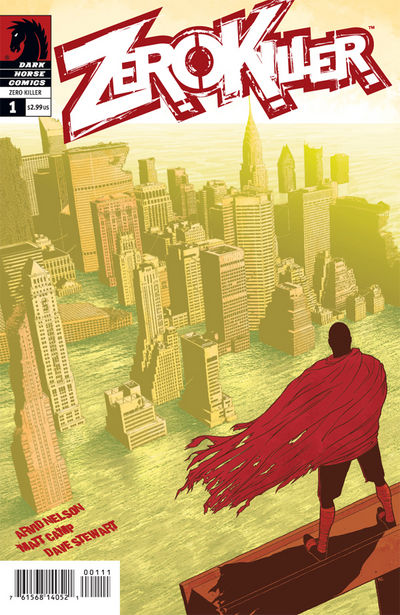
Arvid Nelson, the mind behind Dark Horse's Rex Mundi series, has created another exciting world in Zero Killer, which tells of an alternate history Earth in which nuclear attacks in the early 1970s wiped out over 90 percent of the human race. Thirty-something years later, New York City is ravaged, ransacked, and under about one hundred feet of foul water. After decades of scavenging, fighting, and barely getting by, New York survivors have fallen into gang rule and an entirely new society has formed, based on feudal relationships between desperate survivors and the physically and politically superior gang leaders.
Arvid was gracious enough to set aside a couple moments from his busy day and talk with us about his newest post-apocalyptic vision.
Dark Horse: What are your first sequential art memories? Newspaper strips? Kids' comics? Superhero Comics? None of the above?
Arvid Nelson: I was actually a very casual comic book reader until after college-probably the exact opposite of most people. But the first time I got really excited about a comic was reading Marshal Law: Fear and Loathing in high school. It's still my favorite!
DH: When you're writing, do you write at a preferred, regularly scheduled time and place, or do you write just any old time the inspiration hits you? Do you ever write longhand?
AN: Sometimes I'll do outlines by hand, but only if I don't have access to a computer. I always hear about writers getting up at five in the morning to hit the keyboard. I don't know how they do it. Most days, I can't get motivated until about ten o'clock at night.
DH: If you've ever written, brainstormed, or journaled in public, what's one of the oddest real-life scenes that you've documented AND used in a comic?
AN: You know, I once had a bad experience incorporating a real-life event into a story. I've never tried it again. Reality is just too weird to be believed in fiction.
DH: How essential are your comic book backup and online bonus articles to the understanding of both Rex Mundi and Zero Killer? Could someone read just the comic book pages and understand the story without the bonus alternate-history prose, "news reports," and timelines?
AN: For me, the supplemental material is an important part of the storytelling process, and I hope it enriches the experience for the reader. It's a way to tie up little loose ends I don't have room for in the comic and a way to throw little Easter eggs to readers. But no, one doesn't need to read the supplements to get the story. I try to make the comics stand on their own.
DH: Are we going to find out how Zero got to be such an incredible badass?
AN: You bet! I have that scene pretty clearly planned out in my head. It's just a matter of finding the most opportune place to insert it.
DH: Being an active member of the Baha'i faith, do you have aspirations to create any historical or informational religious comics, somewhat like what Mike Allred is doing with his series The Golden Plates, his adaptation of the Book of Mormon?
AN: Not really, not at this point. Doing something overtly religious seems like preaching to the converted to me. All my stories are, at the deepest level, a meditation on Baha'í principles, but I'm not proselytizing. It would make me uncomfortable if someone were surreptitiously trying to convert me with their writing, so I'd never do that to someone else.
DH: I understand you are a metal-head. Did you ever pick up that Merciful Fate album that Tim recommended at NY Comic Con? If so, what did you think of it?
AN: That's Mercyful Fate, fella! Metal rules! METAAAAL!!!
DH: What was the last really great movie you saw?
AN: Easy! Beauty and the Beast, directed by Jean Cocteau.
DH: What martial arts do you study? Is there something about it that made you choose it over all the other disciplines?
AN: I've studied Akido, Tae Kwon Do, Ba Gua Zhang, and Kempo. Kempo's the one I'm most familiar with, I did that for about fifteen years. The reason for that, first and foremost, is that I had great instructors. Jerry and Nancy Simon. They taught me a lot more than kicking and punching. I also liked Kempo because of its practicality, its "real-world applicability."
DH: If you could eat only one kind of food for the next thirty days, what would it be?
AN: Pizza! Pizza! Pizza! Pizza! Pizza! Pizza! Pizza! Pizza! Pizza! Pizza! Pizza! Pizza! Pizza! Pizza! Pizza! Pizza! Pizza! Pizza! Pizza! Pizza! Pizza! Pizza! Pizza! Pizza! Pizza! Pizza! Pizza! Pizza! Pizza! Pizza!
DH: What inspired you to write comics for a living?
AN: I was really interested in film after college, in fact, I still am. But after getting rejected from film school and PA'ing on a few movie sets, I realized what I really wanted to do was write and create stories. Comics just seemed like an easy way to "get up and go." But since then they've become an end unto themselves.
DH: Can you share any exciting details about the Rex Mundi movie?
AN: There are lots of things happening! I wish I could talk more about this, but we have to manage how and when we disseminate information. I will gladly divulge details in person to anyone who compliments me on how smart I am.
DH: If ZeroKiller were to be made into a movie, which actor could you see in the role of Zero?
AN: I dunno, actually. Zero, as we'll see in Issue 3, has some serious problems. I'd like to see him played by someone who understands both the tight-lipped persona he projects and his interior turmoil.